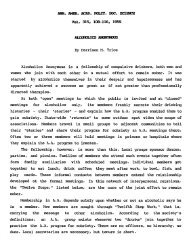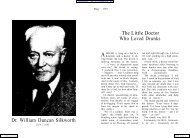with special reference to alcoholism surrender versus ... - Silkworth.net
with special reference to alcoholism surrender versus ... - Silkworth.net
with special reference to alcoholism surrender versus ... - Silkworth.net
Create successful ePaper yourself
Turn your PDF publications into a flip-book with our unique Google optimized e-Paper software.
Compliance is, therefore, a word which portrays mixed feelings, divided sentiments. There is a<br />
willingness <strong>to</strong> go along but at the same time there are some inner reservations which make that<br />
willingness somewhat thin and watery. It does not take much <strong>to</strong> overthrow this kind of willingness.<br />
The existence of this attitude will probably appear as neither strange nor new. Nor is it, until one<br />
begins <strong>to</strong> see how it operates in the unconscious.<br />
One thing must be made absolutely clear: There is a world of difference between' thinking of<br />
compliance in conscious terms and in unconscious terms. The following discussion is focused wholly<br />
on unconscious reactions and cannot be translated in<strong>to</strong> conscious reactions until the possible effect<br />
of the former upon the latter is appreciated. An illustration at this point may be helpful. An<br />
alcoholic, at the termination of a long and painful spree, decides that he has had enough. This<br />
decision is announced loudly and vehemently <strong>to</strong> all who will listen. His sincerity cannot be<br />
questioned. He means every word of it. Yet he knows, and so do those who hear him, that he will<br />
be singing another tune before many weeks have elapsed. For the moment he seems <strong>to</strong> have<br />
accepted his <strong>alcoholism</strong> but it is only <strong>with</strong> a skin-deep assurance. He will certainly revert <strong>to</strong><br />
drinking. What we see here is compliance in action. During the time when his memory of the<br />
suffering entailed by a spree is acute and painful he agrees <strong>to</strong> anything and everything. But deep<br />
inside, in his unconscious, the best he can do is <strong>to</strong> comply -- which means that, when the reality<br />
of his drinking problem becomes undeniable, he no longer argues <strong>with</strong> incontrovertible facts The<br />
fight, so <strong>to</strong> speak, has been knocked out of him. As time passes and the memory of his suffering<br />
weakens, the need for compliance lessens. As the need diminishes, the half of compliance which<br />
never really accepted begins <strong>to</strong> stir once more and soon resumes its way. The need for accepting<br />
the illness of <strong>alcoholism</strong> is ignored because, after all, deep inside he really did not mean it, he had<br />
only complied. Of course consciously the victim of all this is completely in the dark. What he gets<br />
is messages from below which slowly bring about a change in conscious attitudes. For a while drink<br />
was anathema but now he begins <strong>to</strong> <strong>to</strong>y <strong>with</strong> the thought of one drink, and so on, until finally, as<br />
the noncooperative element in compliance takes over, he has his first drink. The other half of<br />
compliance has won out; the alcoholic is the unwitting victim of his unconscious inclinations.<br />
It is the nature of the word <strong>to</strong> have this two-faced quality of agreeing and then reneging. It is<br />
only by realizing the widespread ramification of the compliance tendency that its far-flung<br />
importance can be appreciated.<br />
One of the first things <strong>to</strong> recognize is the fact that the presence of compliance blocks the<br />
capacity for true acceptance. Since compliance is a form of acceptance, every time the individual is<br />
faced <strong>with</strong> the need <strong>to</strong> accept something he falls back on compliance, which serves for the<br />
moment -- the individual consciously believing that he has accepted. But since he has no real<br />
capacity <strong>to</strong> accept, he is soon swinging in the other direction, his seeming acceptance a thing of<br />
the past. In other words, the best an inwardly complying person can do <strong>to</strong>ward acceptance is <strong>to</strong><br />
comply. During treatment the patient regularly is surprised <strong>to</strong> learn that his previous tendency <strong>to</strong><br />
agree in order <strong>to</strong> be agreeable was merely a lot of compliance <strong>with</strong>out any genuine capacity <strong>to</strong><br />
accept.<br />
This unconscious split in the compliance mechanism has deep psychosomatic reverberations.<br />
One patient, who had uncovered a wide streak of compliance, had a dream in which he placed the<br />
two components of compliance side by side, disclosing their utter incompatibility. What he saw was<br />
that his wish <strong>to</strong> be cooperative and well liked while yet maintaining his ego intact meant certain<br />
conflict, <strong>with</strong> other people whose very existence was a threat <strong>to</strong> his own ego. He was <strong>to</strong>rn by the<br />
dilemma of being nice and pleasant or being a man and holding his own. His next dream contained<br />
a busy ferry-boat plying back and forth across a river. As the patient watched, it went faster and<br />
faster and faster, the patient following its motion closely. Soon it seemed as if he were following<br />
the flight of a tennis ball while sitting at the <strong>net</strong>, his head turning more and more rapidly until<br />
finally he became giddy and woke up feeling dizzy. When the patient, and physician, saw the<br />
connection between this dream and the dilemma of his preceding dream, he laughed and<br />
remarked, "You know, I have been doc<strong>to</strong>ring for many years and have heard all about this<br />
psychosomatic business, but I never thought I would learn about it from myself."<br />
Compliance creates other problems for the individual. Since it says "yes" on the surface and<br />
"no" inside, it contributes <strong>to</strong> the sense of guilt. The person who says yes and feels the opposite<br />
has an inward realization that he is a two-faced liar; this stirs up his conscience and evokes a















